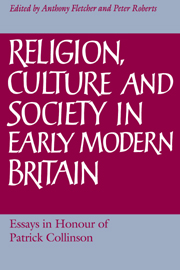Book contents
- Frontmatter
- Contents
- List of illustrations
- List of contributors
- Preface
- List of abbreviations
- Patrick Collinson
- 1 Nicolas Pithou: experience, conscience and history in the French civil wars
- 2 Elizabethan players and minstrels and the legislation of 1572 against retainers and vagabonds
- 3 Cleanliness and godliness in early modern England
- 4 Blood is their argument: men of war and soldiers in Shakespeare and others
- 5 Pragmatic readers: knowledge transactions and scholarly services in late Elizabethan England
- 6 The gardens of Sir Nicholas and Sir Francis Bacon: an enigma resolved and a mind explored
- 7 The Protestant idea of marriage in early modern England
- 8 James VI and I: furnishing the churches in his two kingdoms
- 9 A British patriarchy? Ecclesiastical imperialism under the early Stuarts
- 10 The Anglo-Scottish Union 1603–1643: a success?
- 11 Popery, purity and Providence: deciphering the New England experiment
- 12 Provincial preaching on the eve of the Civil War: some West Riding fast sermons
- 13 Popular form, Puritan content? Two Puritan appropriations of the murder pamphlet from mid-seventeenth-century London
- 14 The two ‘National Churches’ of 1691 and 1829
- Bibliography of the published writings of Patrick Collinson, 1957–1992
- Index
13 - Popular form, Puritan content? Two Puritan appropriations of the murder pamphlet from mid-seventeenth-century London
Published online by Cambridge University Press: 03 December 2009
- Frontmatter
- Contents
- List of illustrations
- List of contributors
- Preface
- List of abbreviations
- Patrick Collinson
- 1 Nicolas Pithou: experience, conscience and history in the French civil wars
- 2 Elizabethan players and minstrels and the legislation of 1572 against retainers and vagabonds
- 3 Cleanliness and godliness in early modern England
- 4 Blood is their argument: men of war and soldiers in Shakespeare and others
- 5 Pragmatic readers: knowledge transactions and scholarly services in late Elizabethan England
- 6 The gardens of Sir Nicholas and Sir Francis Bacon: an enigma resolved and a mind explored
- 7 The Protestant idea of marriage in early modern England
- 8 James VI and I: furnishing the churches in his two kingdoms
- 9 A British patriarchy? Ecclesiastical imperialism under the early Stuarts
- 10 The Anglo-Scottish Union 1603–1643: a success?
- 11 Popery, purity and Providence: deciphering the New England experiment
- 12 Provincial preaching on the eve of the Civil War: some West Riding fast sermons
- 13 Popular form, Puritan content? Two Puritan appropriations of the murder pamphlet from mid-seventeenth-century London
- 14 The two ‘National Churches’ of 1691 and 1829
- Bibliography of the published writings of Patrick Collinson, 1957–1992
- Index
Summary
At about four o'clock on the morning of 6 August 1657 o n e Nathaniel Butler, an apprentice of a London silkman, Arthur North, took a knife and cut the throat of his fellow-apprentice John Knight. Knight died and Butler was arrested, convicted and executed. On the face of it this was an event of no particular significance (except for Butler and Knight, of course). However, it became the subject of a number of printed pamphlets. That, too, was not particularly unusual; bloody or shocking crimes were often the subject for short, sensationalist pamphlets written in a hurry and printed for profit. Only some of the pamphlets prompted by Butler's deed answered this description. One written and attested to by a number of prominent Presbyterian ministers, co-ordinated by Stephen Yearwood, the lord mayor's chaplain, and provided with a preface by the mayor himself, dwelt not so much on the gory details of the murder as oh the subsequent spiritual development and deportment of the murderer in prison and on the scaffold. Here was a rather striking amalgam of two distinct genres, the Puritan conversion narrative and the murder pamphlet. Taken together with a very similar account of another apprentice murder committed by Thomas Savage in 1668, these pamphlets represent a curious meeting of the popular, the profane and the Puritan, at a time when conventional accounts of the failure of godly reformation in the 1650s picture the cultural gap between ‘the people’ and ‘the godly’ as a yawning chasm of mutual incomprehension and antipathy.
- Type
- Chapter
- Information
- Religion, Culture and Society in Early Modern BritainEssays in Honour of Patrick Collinson, pp. 313 - 334Publisher: Cambridge University PressPrint publication year: 1994
- 6
- Cited by

